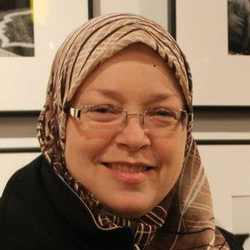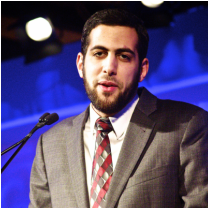CHICAGO – Finding themselves in a tumultuous political environment created by the latest election, American Muslims gathering in Chicago for the annual MAS-ICNA convention are questioning their presence in society, in their pursuit for credibility and authenticity.
In one of the earliest sessions of the MAS-ICNA convention in Chicago, IL, Karen Danielson and Mohammed Abutaleb talked extensively about the importance of interfaith work, community involvement and the need to extend the Muslim community’s wings to the very roots of the society around them.
Karen began the theme of the lecture saying that in America, “we must be able to start creating an environment where Muslims and Islam have authenticity.”
She talked about the need for the Muslim community to realize its Abrahamic roots, and to be able to connect with the Christian and Jewish faith groups that surround it.
She added that the shared struggles of immigrant groups has resulted in connecting and organizing these groups against discrimination and bigotry.

Karen is the recipient of the Gift of Hope 2015 Illinois Lifesavers Award.
The importance of reaching out to one’s neighbors and like-minded groups could possibly not only humanize a community, but ultimately display the humanitarian minded approach many Muslims already have.
Karen stressed the magnitude of the fear of current Muslims and the constitutional implications that laid bare before them.
“It is unconstitutional to be asked your faith or your religion. You cannot register or be registered for a religious ideology. You can be registered for a political ideology,” she told audience.
However, such efforts were clearly underway, regardless of how unconstitutional it might be. Therefore, connecting with other groups was immensely important, to be able to combat gloom Islamophobia that shrouded everyday interactions.
Social Justice

Mohamed AbuTaleb serves as the Imam of the Islamic Association of Raleigh.
At the second part of the session, Mohamed Abutaleb addressed the importance of social justice in the lens of everyday Muslim.
He stressed the importance of careers in the humanities and arts, as necessary careers to help “tell the story and narrative of Muslims in America”.
He went over the various statistics that showed the incredible knowledge gap that Americans had about Muslims, saying, “Up to more than 50% of Americans had never consciously met a Muslim in their life.”
Furthermore, he shared that the amount of individuals of a Muslim background that participated in extremism constituted is no more than “0.0003% of Muslims” worldwide.
Abutaleb added that almost “1 in 10 physicians nationwide were Muslim” and the possibility to be “healed by a Muslim” were much higher than one that were to harm them.
Towards the end of the session, the speakers answered questions on several topics that had to do with the extent of the Muslim community and their efforts towards expanding in their communities and rooting themselves more deeply.
The most notable question after the lecture was: “What instances are there outside of interfaith efforts, can Muslims be less disconnected from the broader American communities around them?”
Mohamed Abutaleb answered:
“Coming out of the cocoon is very uncomfortable, and connecting with people different from us can be challenging, but the Prophet (S) did connect with people of other faiths around him, whether it’s helping the homeless, or helping the needy or serving in increasingly Muslim populations in prisons, who need Khutbas for Jummah prayer, and so on and so forth. Also standing for the rights of others, not just the rights of Muslims. All of these things outside of the masajid, and organizations and so forth. I think it’s important to know that you don’t need to be a scholar to understand what’s permissible and what’s not on these issues. “
The session had not only illuminated on the very existing efforts and realities of being Muslim in America, but also addressed the re-establishment of credibility in American society and the need to be able to confirm the Muslim record in America.
Muslims are not a foreign entity in the American narrative and the lambasting efforts by Islamophobes will show to be futile very soon.
The need to “de-media-ify” the American public about Muslims is an effort that must be heightened and practiced as Muslims should ultimately work strongly to illuminate on the mystery and darkness that shrouds their existence in America.
If Muslims wanted to establish more authenticity, the lecturers resounded, they have to prove their usefulness in everyday society, to properly demonstrate the nature of Islam and Muslims.
